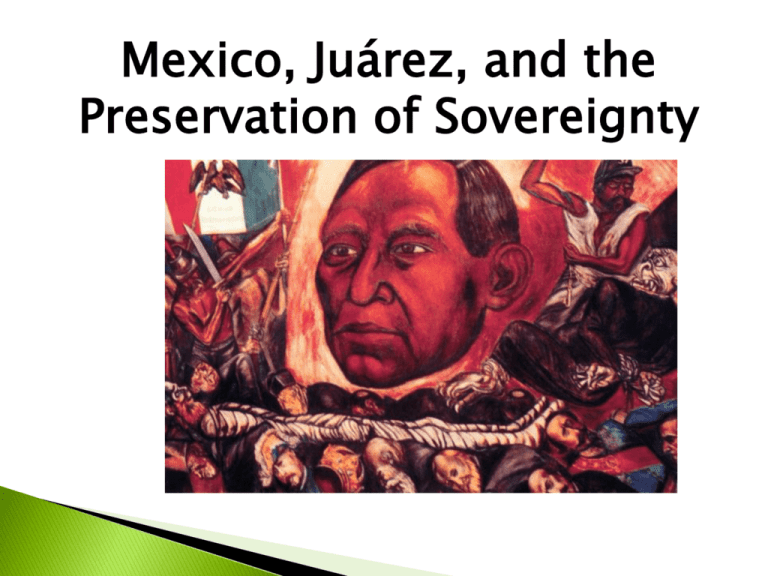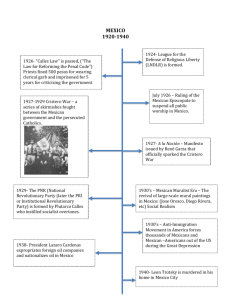Mexico Juárez and the Preservation of
advertisement

Mexico, Juárez, and the Preservation of Sovereignty Even after the achievement of independence, some Western Hemisphere nations, like Mexico, had to defend themselves against Europe’s great powers Within thirty years of independence the United States fought a second war with England – the War of 1812 (1812 – 1815) The weakness of the new republic was symbolized by the burning of the White House and the Capitol by British troops in 1814 Yet by the end of the nineteenth century the United States was the hemisphere’s greatest military power Its war against Spain in 1898 – 1899 created an American empire that reached from the Philippines in the Pacific Ocean to Puerto Rico in the Caribbean Sea Europe also challenged the sovereignty of Latin American nations Mexico faced serious threats to its sovereignty, defeating a weak Spanish invasion in 1829 and a French assault on the city of Veracruz in 1838 Mexico also faced a grave threat from the United States In the 1820s Mexico had encouraged Americans to immigrate to Texas, which at that time was part of Mexico By the early 1830s Americans outnumbered Mexican nationals in Texas by four to one and were aggressively challenging Mexican laws such as the prohibition of slavery In 1835 political turmoil in Mexico led to a rebellion in Texas by an alliance of Mexican liberals and American settlers Mexico was defeated in a brief war, and in 1836 Texas gained its independence In 1845 the United States made Texas a state, provoking war with Mexico a year later American forces eventually captured Mexico City, and a punitive peace treaty was imposed in 1848 The treaty forced Mexico to cede additional territories to the United States, including present-day New Mexico, Arizona, and California In return Mexico received $15 million When gold was discovered in California in 1848, the magnitude of Mexico’s loss became clear With the very survival of the nation at stake, Mexico’s liberals took power and imposed sweeping reforms that provoked a civil war with the conservatives (1856 - 1861) The French invaded Mexico in 1862, using unpaid government debts as an excuse Mexico’s conservatives allied themselves with the French invaders, and the president of Mexico, Benito Juárez, was forced to flee to Mexico City The French then installed the Austrian Habsburg Maximilian as emperor of Mexico Juárez organized an effective military resistance and after years of warfare drove the French army out of Mexico in 1867 After capturing Maximilian, Juárez ordered his execution Benito Juárez was remembered as a war leader and a symbol of Mexican nationalism It is interesting to reflect on Benito Juárez’s life An Amerindian orphan, he became a lawyer and political reformer He helped drive the dictator Antonio López de Santa Anna from power in 1854 and helped lead efforts to reduce the power of the Catholic Church and the military He later served as a chief justice of the Supreme Court and as president When conservatives rebelled against the Constitution of 1857, Benito Juárez assumed the presidency and led liberal forces to victory Mexico’s conservatives turned to Napoleon III of France, who sent an army that suspended the constitution and imposed Archduke Maximilian of Habsburg, brother of Emperor Franz Joseph of Austria, as emperor But the French army could not defeat Juárez, and Mexican resistance was eventually supported by U.S. diplomatic pressure This victory over a powerful foreign enemy redeemed a nation that had earlier been humiliated by the United States But the creation of democracy proved more elusive than the protection of Mexican sovereignty Despite the Mexican constitution’s prohibition of presidential reelection, Juárez would serve as president until his death in 1872






